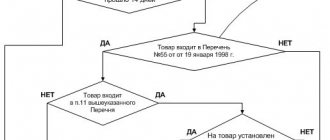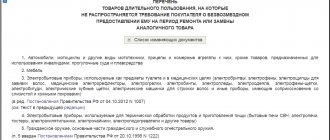Requirements under the Law of the Russian Federation of February 7, 1992 No. 2300-1 “On the Protection of Consumer Rights” (ZoPPP) can be declared by a citizen who purchased a product or service for personal needs not related to business.
Pre-trial claims procedure for consumer disputes is not required as a general rule. But in some cases a pre-trial claim is necessary:
- the consumer is going to collect a fine in his favor for refusing to voluntarily satisfy his demands in the amount of 50% of the amount collected, established by clause 6 of Art. 13 of the Law of the Russian Federation of February 7, 1992 “On the Protection of Consumer Rights”. To collect such a fine, it is necessary that the consumer sends demands to the seller before the trial, and he refuses to fulfill them;
- the consumer makes demands in connection with the provision of communication services (Article 55 of the Federal Law of July 7, 2003 126-FZ “On Communications”);
- the consumer demands to terminate the contract with the seller (clause 2 of article 452 of the Civil Code of the Russian Federation).
State duty benefits for consumers
A citizen-consumer does not pay a state fee when going to court if the amount of claims in the claim does not exceed 1 million rubles. This amount includes only the plaintiff’s property claims. Compensation for moral damage that can be recovered under the PPA is not taken into account.
If the value of the claim exceeds 1 million rubles (for example, the dispute is about expensive property), the state duty is paid on the amount of the excess at the rates determined for property claims:
o up to 20,000 rubles - 4% of the claim price, but not less than 400 rubles;
o from 20,001 rubles to 100,000 rubles - 800 rubles plus 3% of the amount exceeding 20,000 rubles;
o from 100,001 rubles to 200,000 rubles - 3,200 rubles plus 2% of the amount exceeding 100,000 rubles;
o from 200,001 rubles to 1,000,000 rubles - 5,200 rubles plus 1% of the amount exceeding 200,000 rubles;
o over 1,000,000 rubles - 13,200 rubles plus 0.5 percent of the amount exceeding 1,000,000 rubles, but not more than 60,000 rubles.
For example, upon a request to terminate a purchase and sale agreement for a low-quality car and return the funds paid to the car dealership in the amount of 1,750,000 rubles, the state duty is calculated according to the following rules:
- The state duty is calculated in the amount established for property claims from the entire cost of the claim - 13,200 rubles + 0.5% of 750,000 rubles (amount exceeding 1,000,000 rubles) = 16,950 rubles
- from it the amount of state duty payable if the claim price is 1 million rubles is deducted (i.e. 13,200 rubles in accordance with clause 1, clause 1, article 333.19 of the Tax Code of the Russian Federation),
- the difference in the amount of 3,750 rubles is paid to the budget before going to court.
The consumer can choose which court to file a claim:
- at your place of residence; or
- at the location of the seller who violated consumer protection laws, or
- at the place of conclusion or execution of the contract with the seller (i.e. the place of purchase, provision of services, etc. (clause 7 of article 9 of the Civil Procedure Code of the Russian Federation).
The state fee is paid according to the details of the court authorized to consider the case. Depending on the amount of the claim, the claim must be filed:
- to the magistrate, if the amount of property claims against the defendant does not exceed 50,000 rubles (clause 5, clause 1, article 23 of the Code of Civil Procedure of the Russian Federation);
- to a district court of general jurisdiction - in all other cases (Article 24 of the Code of Civil Procedure of the Russian Federation).
Claims for compensation for moral damage caused to the consumer are considered by the same court that is authorized to consider property claims. If material claims are not stated, the case falls within the jurisdiction of the district court of general jurisdiction.
How to calculate correctly
As we said above, the purchase of a low-quality but inexpensive household appliance does not require payment of state duty at the start of a legal dispute with the seller. But if the acquisitions are expensive and the litigation has not only a moral, but also an economic sense, it is advisable to calculate the state duty for claims for the protection of consumer rights in advance. The amounts can be significant and you should be aware of this.
The calculation occurs in two stages:
- The base amount is 13,200 rubles;
- 0.5% of the claim amount is added to it if it exceeds 1 million.
The state fee for the administration of justice cannot exceed the barrier of 60 thousand rubles.
The exact amount of the state fee to be paid can be calculated by a specialized lawyer or you yourself, using the information on the website of the relevant court.
We suggest you read: How to return payment of state duty to the traffic police
Let's name a few amounts of fees when claims exceed 1 million:
- 1.5 million – 15,700 rubles;
- 2 million – 18,200 rubles;
- 2.5 million – 20,700 rubles;
- 5 million – 33,200 rubles;
- 10 million – 58,200 rubles;
- 15 million – 60,000 rub.
Benefits when appealing a court decision
When appealing court decisions in the appellate and cassation instances (courts of constituent entities of the Russian Federation - cities, regions, territories), as well as when filing supervisory complaints to the Supreme Court, citizens-consumers are exempt from state fees when filing appeal, cassation and supervisory complaints.
This benefit does not apply to other participants in the case (defendant - seller). The defendant in a claim for the protection of consumer rights pays a state fee for filing a counterclaim, appeal, cassation and supervisory appeal according to the general rules.
When do you need to pay state duty?
Legislators have prescribed a separate chapter in the Tax Code regulating this issue. If we move away from complex legal formulations, state duty can be called a fixed fee with regulation of its size depending on the applicant’s claims. The larger the amount of the claim, the larger the state duty.
The law obliges to pay state duty on claims only if the dispute concerns large amounts. More on this below, but now it is important to understand that the state duty in cases of consumer rights protection, as in other legal proceedings, is intended to organize the professional work of the courts, as an independent arbiter between the buyer and seller of goods.
The fee paid to the budget in the event of a loss of the case is not returned to the claimant; in the event of a win, the entire amount will be compensated by the losing party in full. The main thing is to include such a requirement in the claim.
If the submitter of the claim is not included in the preferential category of citizens exempt from such payments, the amount will consist of the rate and a percentage of the amount of the claim.
The first thing you need to do when filing a claim is pay the fee. This rule applies to all plaintiffs, except those specifically designated in the Tax Code: socially vulnerable citizens or organizations that represent their interests.
Without the actual transfer of money to the budget account, that is, without paying the state duty, the claim will not be considered. The court warns the applicant that the case is suspended until payment is confirmed.
Bank details and accounts for transferring the required amount are presented on the website of the relevant court in electronic form and on the information stand in the building of the institution itself in printed form.
Collection of state duty if the claim is won
If the plaintiff - consumer wins the case, the state duty is recovered from the defendant in proportion to the satisfied part of the claim based on the amount that the plaintiff should have paid if he had not been exempt from paying the state duty (part 1 of article 103 of the Code of Civil Procedure of the Russian Federation, subparagraph 8 of paragraph 1 of the article 333.20 of the Tax Code of the Russian Federation, paragraph 4 of the Resolution of the Plenum of the Supreme Court of the Russian Federation of December 11, 2012 No. 30 “On the practice of courts considering cases related to the implementation of citizens’ rights to labor pensions”).
The concept of state duty to court
The state duty is a special fee that must be paid before applying to various authorities (judicial, notary, registration, etc.) for their performance of necessary operations (Article 333.16 of the Tax Code of the Russian Federation).
The amount of such a fee for the purposes of legal proceedings and the specifics of its payment are established in Art. 333.21, 333.22 Tax Code of the Russian Federation.
- Clarify payment details by contacting the institution itself or using the information posted on the court’s website.
- Pay the required amount by bank transfer - through a bank.
If the consumer's claim is denied
If the plaintiff-consumer loses the case, the court does not collect the state duty from him. According to paragraph 1 of Art. 103 of the Civil Procedure Code, the state duty, from which the plaintiff was exempted, is recovered from the defendant in proportion to the satisfied part of the claims. The collection of state duty from a plaintiff who is exempt from paying it is not provided for by law.
Regardless of whether the court of first instance rejected the claim, or whether the decision in favor of the defendant was made upon further appeal, it is unlawful to collect state duty from the plaintiff-consumer (Review of judicial practice of the Supreme Court of the Russian Federation of August 10, 2005).
How can you defend consumer rights?
According to statistics, it is extremely difficult to win a lawsuit on credit issues - denials of claims account for 69% of cases. Therefore, it is important to use all available tools for pre-trial dispute resolution: you can reach an agreement with many banks and even microfinance organizations if you act legally competently.
Procedure:
- Write and submit to the bank an application for refusal of personal interaction. This right is stated in paragraph 2 of part 1 of article 8 of Federal Law No. 230. You can use the right 4 months from the date the debt on the loan arose.
- Revoke your permission to process personal data. Few people know that this can be done legally. The borrower needs to draw up a written application and submit it to the bank.
- Do not allow the financial organization to transfer any data about you to third parties, including information about overdue debts, place of residence, methods of debt collection, etc. To do this, a letter with a written prohibition is sent to the creditor.
The listed methods provide protection from illegal actions in case of overdue loans. If a bank or microfinance organization has imposed an additional service, provided it poorly, changes the provisions of the loan agreement unilaterally, or otherwise violates the rights defined by current legislation, you can write a claim to the bank.
In some cases, the consumer may file a complaint with the Central Bank to resolve the conflict.
Cases for contacting the Central Bank of the Russian Federation:
- The bank charges illegal fees. If the loan payment has increased, or the speed of its repayment has slowed down, you can contact a specialist to check the nuances. If the fact of illegal commissions is confirmed, and the bank does not make concessions, you can safely file a complaint.
- Refusal to provide certain services or imposition of insurance (with the exception of collateral insurance when applying for a mortgage).
- Illegal write-offs of funds to repay loans.
- Refusal to provide a loan agreement or other lending documents. Such a gross violation is rare, but cases are known.
- Illegal issuance of a loan, for example, based on a lost passport or an incapacitated person.
- Disclosure of personal data by bank employees.
- Introduction of high fines or penalties, accrual of interest on them.
- Unlawful actions of debt collection services or collection organizations.
- Submitting false information about the borrower or his loan to the credit bureau.
In addition to the Central Bank, you can file a complaint with Rospotrebnadzor, as well as submit a written statement to the prosecutor's office. Typically, such actions are very unpleasant for banks and, if there is indeed a violation of consumer rights, financial organizations will accommodate them halfway. Compared to litigation, this path is less expensive; you can defend your interests faster and with a greater degree of probability.
Complaint to Rospotrebnadzor
The Federal Service for Supervision of Consumer Rights Protection and Human Welfare (Rospotrebnadzor) monitors compliance with consumer rights. Based on requests from citizens, Rospotrebnadzor bodies are authorized to issue orders to eliminate violations of the law, consider cases of administrative offenses and impose fines. If an organization or individual entrepreneur does not comply with the requirements of Rospotrebnadzor, a fine may be collected from him on the basis of the Code of the Russian Federation on Administrative Offenses. The complaint is submitted to the territorial department of Rospotrebnadzor in person or in electronic form; it is not paid with state duty. A response to a complaint must be issued within 30 days.
What violations occur most often?
Protection of consumer rights under loans may be required in different situations. Banks and microfinance organizations go to various lengths to attract new clients and are able to impose obviously unfavorable conditions on them. The list of violations in this area is extensive:
- Providing a loan only when taking out personal insurance. In the case of a mortgage, many banks also impose title insurance, in relation to which the consumer has the right, but not the obligation.
- Introduction of a complex system of calculating interest in case of late payment of a loan. The interest rate must be clearly stated and calculated on the amount of the debt.
- The bank reduces the loan terms, even if the borrower violates the provisions of the loan agreement. The bank does not have the right to demand early repayment of the loan, except for the situations described in Art. 821.1 of the Civil Code of the Russian Federation, as well as if they are reflected in the loan agreement for an individual entrepreneur or legal entity.
- Attempts by the bank to charge additional fees for early repayment of the loan.
- Providing services, including paid ones, without the permission of the borrower. The most striking example is the connection of paid SMS notifications about account status.
- The bank increases the interest rate without notifying the client.
- Transfer of debt to third parties without notifying the borrower.
The difficulty lies in the fact that some banks and microfinance organizations try to protect their interests as much as possible with the help of a loan agreement, some provisions of which can be difficult for an unprepared person to understand. The situation is complicated by the habit of citizens signing documents without careful study and consultation with a lawyer. As a result, it becomes difficult to protect the rights of consumers on bank loans, even in court.
State duty benefits for consumers do not apply
Legislation on the protection of consumer rights does not regulate relations of citizens with homeowners' associations, housing construction cooperatives, housing savings cooperatives, horticultural, gardening and dacha non-profit associations of citizens, if these relations arise in connection with citizens' membership in these organizations. But if a dispute arose over the provision of paid services to a citizen by an organization (HOA, SNT), the Law of the Russian Federation “On the Protection of Consumer Rights” will be applicable (clause 7 of the Resolution of the Plenum of the Supreme Court of the Russian Federation dated June 28, 2012 No. 17 “On the consideration by courts of civil cases on disputes regarding the protection of consumer rights").
Still have questions? Contact a lawyer: the information provided in this article is general in nature and does not replace legal advice on a specific case.
In what cases is state duty paid?
As usual, there are exceptions to the general rule:
- In accordance with Article 333.36 of the Tax Code of the Russian Federation, persons filing claims to ensure consumer rights do not pay state duty. But if the total amount of claims in the claim exceeds one million rubles, then, according to the same article, the plaintiff is obliged to pay an amount at the rate of 13,200 rubles for every million of the amount of the claim. It is not difficult to imagine in what situations these requirements may exceed the established limit. Purchase and sale of real estate, expensive cars, when they are purchased from official distributors or realtors. Each such claim can significantly exceed the maximum amount of one million rubles.
- In addition, some clauses of the law protecting consumer rights impose the obligation to pay state duty on the consumer in cases where the very nature of the relationship and the fulfillment of obligations is a conditional fact. Thus, insurance relations can serve as a clear example of such a case. If the insured person does not agree with the actions of the insurer and goes to court, the fee for considering the claim is paid in full.
State duty when filing an appeal by the defendant
Moscow JSC "First Construction and Installation Trust" filed a cassation appeal, in which the applicant refers to the groundlessness and illegality of the appealed judicial act, requests it to be canceled and the case to be referred for consideration on the merits to the appellate instance of the Arbitration Court of Moscow.
If the applicant asked for a deferment, installment plan, or reduction of the state fee, but did not attach the mentioned documents to the petition, the court will not leave the appeal without movement and Sample appeal.
Do I need to pay a state fee when filing an appeal?
Article 333.19. Tax Code of the Russian Federation - Amounts of the state duty for cases considered by the Supreme Court of the Russian Federation, courts of general jurisdiction, justices of the peace 3) when filing a claim of a property nature that is not subject to assessment, as well as a claim of a non-property nature: for individuals - 300 rubles; for organizations - 6,000 rubles;
Hello! A district court was held in a civil case regarding the collection of loan debt. The so-called new creditor did not provide sufficient evidence that he is the new creditor (so I believe). District Court that . Show in full
Is it possible to defend your rights?
There are many cases of violation of consumer rights, and therefore judicial practice is extensive. Studying it, we can draw an encouraging conclusion: when rights are truly violated and there is evidence, filing a claim in court allows you to win the case. Difficulties arise only with the determination of moral damage and its size.
Usually, sellers of goods and services understand that they have little chance of winning in court and try to accommodate them even at the stage of receiving a claim. Therefore, it is better for the consumer to start with a pre-trial settlement: it is cheaper and does not last as long.
The moment of preparing a claim in court is the most critical, so it is good if an experienced lawyer handles the case. Contact us to schedule an initial consultation or to file a claim. Our lawyers will study the problem in detail, give practical advice, including on collecting evidence, and also draw up a legally competent claim.
0 0 votes
Article rating





